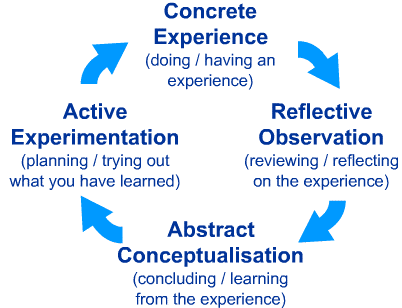Introduce
You will be encouraged to reflect throughout this online learning resource. Reflecting is an important tool for professionals to be able to develop and recognise their own strengths and weaknesses. Reflection can inform professional development and lead to self-directed learning and improved motivation.

Develop
Listen to Dr Madeline Marczak, Principal Clinical Psychologist from Manchester Foundation Trust, explore why reflective practice is so important:
Kolb’s experiential model is represented in the image below:

Source: The Benefits of Experiential Learning and Kolb’s Learning Cycle for Training – ISC Medical
Reflect
Stop and Reflect: Take some time to answer the following questions. Notice what is coming up emotionally for you. Be curious and resist the urge to jump to conclusions or to be judgemental.
– What are your goals and intentions at the start of this course? What strengths do you bring? What are your worries? Are there any barriers that could impact your engagement?
Refer back to the Confidence Rating Scale within the GM REFLECT Framework.
What did you scale your confidence from 0 – 5? 5 is recognising your high level of confidence and competence when working with SEDW in the early years and feeling equipped to support others. 0 is no existing skills or understanding to be able to connect to your current role.






